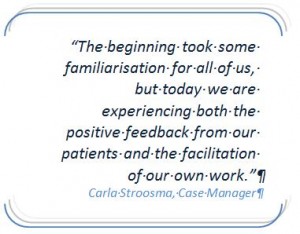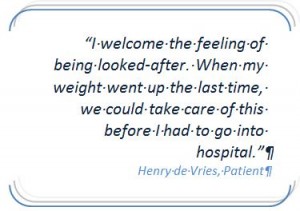All the help in one place
Integrated Social and Health Care Services for patients with Chronic Heart Failure – Velhoven, Netherlands
Common Platform Services for Ageing Well in Europe
When Henry de Vries climbs the stairs in his small house in Veldhoven in the Netherlands, he has to sit down and rest three times on the way up. A friend once told him about a chairlift, but he does not know how and where to get one. Today, his living room is therefore the place where he spends most of his time. Here, everything is arranged so that he can easily reach it: a large chair with a table nearby, on it his glasses, the TV remote, a bottle of water and a box full of medication that he has to take every day. Six years ago, Henry was diagnosed with chronic heart failure after an emergency admission into hospital. Since then, the condition more or less determines his life and that of his wife. He spends a lot of time worrying about his health and what would happen to his wife if something happened to him. He is afraid that his heart might give out again suddenly and without much prior notice, sending him into hospital and leaving his wife alone to look after herself. Henry receives a lot of help from his family, some neighbours and his long-time physician, but fears that this might still not be enough.
Henry’s situation is not uncommon among people suffering from chronic heart failure, in the Netherlands and elsewhere. With increasing severity of their condition they need comprehensive support on different levels and close observation by health care professionals to detect any worsening of the situation as soon as possible.
The service and intervention provided through telehealth procedure
Unsynchronised care service delivery, confined to the separated “silos” of social and health care, is the norm rather than an exception in care provision across Europe and beyond. This leads to inefficiencies, duplication of resources, and potentially to reduced levels of quality of care, and in extreme cases to premature death. Older people are particularly affected by this situation, since they often need both types of services, such as support with daily living activities and chronic disease management.
The need for an integrated care programme targeted to chronic heart failure (CHF) patients was recognised by the primary care organisation PoZoB, a network of approximately 200 General Practitioners working in the Southeast of the Netherlands. Apart from better coordinating care activities and bringing together social and health care components into a holistic approach, PoZoB also realized the potential of modern telecare and telehealth technology to not only improve health outcomes, but also to increase the efficiency and quality of service delivery. In the course of the three year pilot project CommonWell, co-funded by the EU, PoZoB developed, implemented and currently trials an ICT-supported, integrated social and health care service aimed at their heart failure patient population.
From a call-centre available 24 hours, 7 days a week, a specially trained Case Manager is available for PoZoB’s heart failure patients to monitor health status, follow-up on critical situations, answer patients’ questions, liaise with GPs and other professionals, and coordinate social care issues. To facilitate this, the Case Manager has access to an integrated electronic patient file, bringing together data from telehealth and telecare sub-systems in one interface.
The Case Manager contacts the different social care providers who offer the needed service and make sure it is delivered. A practice nurse, specialized in cardiovascular problems, takes care of the planning and coordination of the chronic care of the patients together with the GP. The case manager cooperates with the GP and practice nurse to manage and offer the needed care.
Via a telehealth monitor and connected weight scale and blood pressure meter, the patients’ health status is monitored regularly. If the values are out of range the Case Manager at the call-centre is alerted and immediate action can be taken to early detect and prevent possible exacerbations.
The patients are also equipped with a social alarm connected to the call-centre to be able to call for help immediately and at all times. In this way the patients have one central access point for urgent as well as non-urgent social and medical care.
The benefits of the CommonWell pilot project
The new service is currently being piloted with about 100 users. The main aims of the pilots are as follows:
- Successful implementation of a care programme for chronic heart failure patients for more regulated care following specified protocols.

- Decreased workload for GPs and their offices, by introducing a Case Manager who guides both the medical and the social care for the heart failure patients.
- Realisation of a more complete picture of the heart failure patient (data record) for all care givers (Case Manager, practice nurse, GPs, Cardiologists) including both medical (telehealth) and social (telecare) data to faster take adequate action and coordinate the care for the patients.
- Increased quality of life for the heart failure patients, by means of security and comfort in their home environment and prevented hospital stays.
- One access point for heart failure patients and caregivers for all issues concerning both medical and social care.
To ensure these aims, the pilot is accompanied by a rigorous evaluation scheme (see below). The evaluation encompasses impacts on the patient (health-related quality of life, disease-specific outcomes and hospital admissions, perception of the service and its benefits, satisfaction with the devices used and others), impacts on service staff (impacts on job/role performance, workload, job satisfaction) and impacts on the service provider organisation (appropriate targeting of responses to particular events, development and change management and service utilisation).
At this stage of the pilot it can already be said that patients are overall satisfied with the service and perceive it as a useful support to their own efforts of managing their condition. Vis-à-vis the Case Managers in the call centre, patients repeatedly say that they feel well taken care of and that the regular telehealth monitoring helps to better understand their own disease. In several cases, exacerbations could be detected at an early stage and countered, so that a visit to the hospital was not necessary. The Case Managers report that after an initial period of familiarisation, the service is now running smoothly and begins to show that people are better cared for than before. Through the use of the integrated patient file, services can be delivered in a targeted and efficient manner. Niels van Elderen, director of PoZoB, sees the emergence of a new model of care provision to people with heart failure but potentially also with other chronic conditions. Under this new model, he says, PoZoB will not only provide high-quality care, but can also deliver services with greatly improved efficiency, giving them an edge in an environment where budget cuts are becoming ever more frequent.
ICT-Supported Integrate Care across Europe – the CommonWell Project
The pilot trial carried out by PoZoB in Veldhoven is part of the project CommonWell that develops, implements and pilots integrated services at four sites in Europe: the autonomous region of Andalusia in Spain, and the cities of Bielefeld in Germany, Milton Keynes in the UK and Veldhoven in the Netherlands. The project is co-funded by the European Commission within the CIP ICT Policy Support Programme (Grant agreement no. 225005). 10 partners are cooperating in the project, developing services to support chronic disease management and independent living of older people in general.
Andalusia and Bielefeld are the sites focusing on improving services for independent living for older people. In Andalusia, CommonWell provides users with a high quality service by integrating the information from both emergency and social care services into one common platform. The CommonWell approach in Bielefeld is being applied to a major gap in service provision for older people at German care provider Johanneswerk. It relates to a necessary improvement in the effectiveness of co-operation between social care and healthcare providers on admissions to hospital, and subsequent discharge.
Milton Keynes and Veldhoven are the pilot locations that address chronic disease management for older people suffering from Chronic Obstructive Pulmonary Disease (in Milton Keynes), and Chronic Heart Failure (in Veldhoven, see above). The CommonWell services here improve communication between health and social care providers, helping to reduce anxiety and improve health outcomes for people with chronic conditions and those who need support when leaving hospital.
The integrated services are currently being piloted at the four sites for a duration of 12 months. The results of evaluating the pilot operation will be used to extend service provision and promote the wider uptake of this model of care across Europe. The pilots are evaluated to gain a better understanding of the new services’ added value, user benefits and acceptance, quality of life impacts and economic viability. The evaluation takes into account the nature of the services to be implemented as well as the diverse national care systems, the regulatory and legal conditions, and the local circumstances under which services are to be delivered. The evaluation encompasses the different stakeholder groups involved: end users; informal carers; formal health and social care staff and the provider organisations. A multi-dimensional and multi-method approach has been adopted which can be flexibly applied across sites.
For further information
To learn more about CommonWell, please visit www.commonwell.eu
(July 2011)





